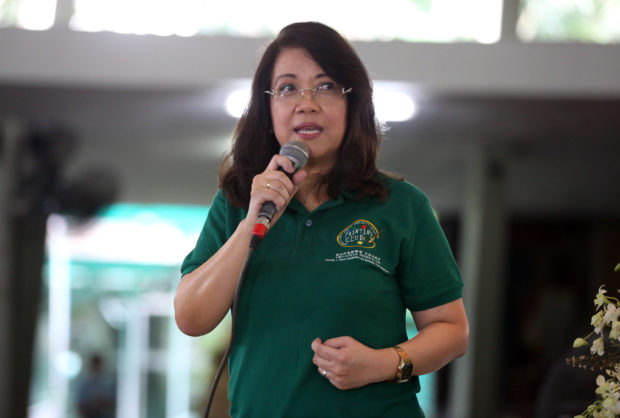Chief justice was just following rules, say her lawyers
It was done in good faith.
The camp of Chief Justice Maria Lourdes Sereno on Tuesday defended her decision to oppose the nomination of Francis Jardeleza, now an associate justice, to the Supreme Court in 2014, saying her action was within the rules set by the Judicial and Bar Council (JBC).
“The exclusion of then Solicitor General Jardeleza from the list [of nominees] was not because the Chief Justice supposedly ‘manipulated’ the list. [He] was excluded because he did not obtain the unanimous vote required [by the JBC],” Jojo Lacanilao, one of Sereno’s spokespersons, said in a statement.
“The Chief Justice, in invoking Section 2, Rule 10 of JBC-09, did not act with malice. She was merely performing her duty as a member of the JBC,” Lacanilao said.
Top-secret document
Article continues after this advertisementThe rule states that “in every case when an integrity of an applicant who is not otherwise disqualified for nomination is raised or challenged, the affirmative vote of all the [JBC members] must be obtained for the favorable consideration of his nomination.”
Article continues after this advertisementTestifying at the impeachment hearing against the chief magistrate at the House of Representatives on Monday, Jardeleza accused Sereno of committing “treason” by accessing “a top-secret document” to block his appointment to the 15-member Supreme Court.
Her supposed “manipulation” of the short list of nominees submitted by the JBC, the constitutional body that vets and screens applicants to judicial posts, to former President Benigno Aquino III was one of the reasons cited by Lorenzo Gadon in his impeachment complaint against Sereno.
At the hearing, Jardeleza claimed that Sereno unlawfully obtained a document regarding the arbitral case brought by the Philippines against China in connection with the West Philippine Sea dispute.
Jardeleza, then the Solicitor General, led the country’s legal team in obtaining the landmark decision from the Permanent Court of Arbitration in The Hague that voided China’s nine-dash policy in the West Philippine Sea.
“I was accused of being disloyal, of being a Judas to our country. But, in my view, it is the Chief Justice who acted disloyally, who was a Judas to our country,” Jardeleza told the House justice committee.
But Lacanilao said Sereno merely “acted in good faith and in accordance with the JBC rules” as ex-officio chair of the council.
He said the Chief Justice made her decision “after receiving and painstakingly verifying reports on [Jardeleza’s] stand on the West Philippine Sea arbitration between the Philippines and China.”
Lacanilao added that these reports had given her reasonable grounds to doubt Jardeleza’s integrity and moral fitness to become a member of the highest court of the land.
Concerns raised by Carpio
Carlo Cruz, another spokesperson for Sereno, said the Chief Justice’s action was prompted by the “concerns raised” by Senior Associate Justice Antonio Carpio, who has championed the country’s fight for the resource-rich region in the South China Sea.
“The entire JBC heeded these concerns and acted accordingly,” Cruz told reporters, adding that it was the Chief Justice’s responsibility to properly heed Carpio’s concerns.
As to Jardeleza’s claim that he was not given a chance to air his side on the issue, Lacanilao said the records of the JBC’s executive session on June 30, 2014, showed that he was allowed to defend himself, but he opted not to “on account of his position that he is entitled to a statement in writing of the charges against him.”
Josa Deinla, another spokesperson for Sereno, described the allegations against her as old issues that had already been resolved.
On Radyo Inquirer 990AM, Deinla said bringing up old issues against the Chief Justice was not enough to strengthen the impeachment case against her.
Probable cause
Speaker Pantaleon Alvarez believes otherwise.
Alvarez said there was mounting evidence to establish probable cause against Sereno after the testimonies of her fellow magistrates in the impeachment hearing.
“I don’t want to preempt the [House justice] committee but we have all been watching. The people have seen the evidence and they can judge whether the complaint is empty or not,” he said in a press briefing on Tuesday.
“In my view, there’s more than enough,” said Alvarez when asked if probable cause had been established against the top magistrate.
The House justice committee concluded its last hearing for 2017 on Monday with the testimonies of Supreme Court Associate Justices Jardeleza, Noel Tijam and Teresita Leonardo-de Castro, and retired Associate Justice Arturo Brion.
They took turns accusing Sereno of showing disrespect to the court by violating its collegial nature through unilateral actions without the approval or contrary to the decision of the entire body.
Alvarez said he tended to trust the statements made by the justices under oath than Sereno’s blanket denials.
The House panel will resume the proceeding in January. —Reports from Marlon Ramos, DJ Yap and Faye Orellana
